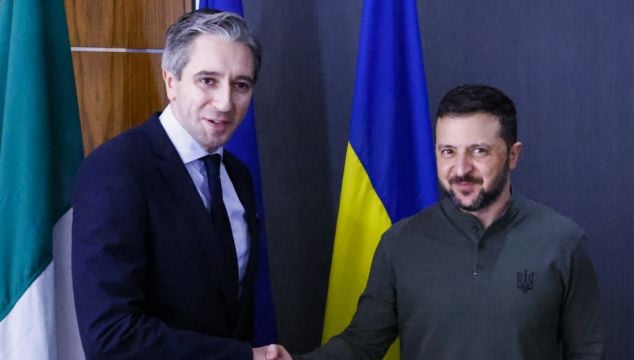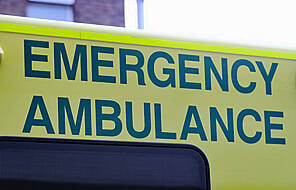Taoiseach Simon Harris is to meet Ukrainian president Volodymyr Zelenskiy in Kyiv as Ireland prepares to announce millions in new funding for Ukraine.
The visit on Wednesday comes the day after at least 50 people were killed and 200 injured when two Russian ballistic missiles struck a military training facility and hospital in Poltava, 200 miles south east of Kyiv.
It was one of the deadliest Russian strikes since the war began.
The incident came as Ukrainian forces attempted to secure territory in Russia’s Kursk border region after a surprise incursion that began last month – and as the Russian army moves deeper into eastern Ukraine.
Mr Harris, who arrived in Kyiv Oblast on Wednesday morning, will sign a joint Agreement with Mr Zelenskiy on Support and Co-operation during a bilateral meeting in the Ukrainian capital.
The Taoiseach will visit areas bombed by Russia and also meet Ukrainian prime minister Denys Shmyhal.
Mr Harris said: “I want to see first hand and with my own eyes the impact of war on the continent of Europe.”
The Taoiseach will also announce €43 million in aid to Ukraine, made up of a new allocation of €36 million to partner organisations through its development body Irish Aid, and €7 million to European Investment Bank projects which had been previously flagged.
The Government said the €36 million package will provide essential humanitarian assistance, support rehabilitation and eventual reconstruction, and contribute to Ukraine’s longer-term goals, including peace, stability and political aspirations.
Mr Harris said: “Two and a half years on from Russia’s full-scale invasion, Ukraine continues to face immense challenges.
“We have seen the remarkable resilience shown by the people of Ukraine in the face of these challenges.
“That same determination and resolve will be needed to rebuild their country, with support from international partners including Ireland.
“We have been unequivocal and steadfast in our support for the people of Ukraine and this additional funding continues to demonstrate that commitment.”
Tánaiste and Minister for Foreign Affairs Micheál Martin said the funding recognises “the particularly horrific impact” of the war on women and children.
He said: “Ireland’s assistance in 2024 (includes) prevention and response to sexual and gender-based violence, support for maternity services and rebuilding of homes for people forced to flee conflict and now living in collective centres.”
The Taoiseach will also express Ireland’s full support for the Ukrainian bid for EU membership while also discussing continued humanitarian assistance.
One focus of the trip is expected to be work towards the return of thousands of Ukrainian children abducted into Belarus and Russia.
Ireland is a member of a global coalition working on the issue and the Taoiseach is scheduled to meet several organisations helping affected families.
Mr Harris said the joint agreement “makes it clear that Ukraine’s values are our values and we will stand with the brave people of Ukraine for as long as it takes”.
He said: “I am very pleased to be in Ukraine to hear at first hand from president Zelenskiy on the situation on the ground and to see for myself the impact it is having on the lives of ordinary Ukrainians.
“Russia’s missile strike and killing of scores of people in Poltava on Tuesday is a grim and horrific reminder of the threat Ukraine is facing every day. We express our outrage and sympathy to the families of those who have died.”
The latest cash will take Ireland’s total funding to Ukraine since February 2022 to more than €380 million, including about €130 million in stabilisation and humanitarian support.
Partners to be supported include the Ukraine Humanitarian Fund (UN OCHA) which has reach across all regions of Ukraine, including significant funding to national organisations, and the United Nations High Commissioner for Refugees (UNHCR) for the provision of shelter and protection to millions of displaced people.
Financial commitments to the UN Population Fund (UNFPA) and the World Health Organisation (WHO) will contribute to work on health infrastructure and support for vulnerable women. Ireland will also support the Red Cross network.
It also includes contributions to the World Bank crisis facility for Ukraine and Moldova, which is aimed at addressing urgent needs, and to the International Monetary Fund Ukraine Capacity Development Fund supporting a reform agenda including EU accession.
A partnership with Lithuania will provide for the construction of bomb shelters in schools in Ukraine.
Mr Zelenskiy and Mr Harris previously met at Shannon Airport in Ireland in July, where the prospect of the joint agreement was raised.
They identified demining, energy, humanitarian assistance and food security as areas of possible cooperation.
At the time, Mr Zelenskiy thanked the people of Ireland for their support in hosting Ukrainian refugees, adding: “You were with us from the very beginning of the Russian invasion.”
After that meeting, Mr Harris announced a €7 million contribution towards the European Investment Bank’s EU for Ukraine fund, which addresses food and energy security needs, as well as support for refugees.
As part of a policy of military neutrality, Ireland does not provide what it characterises as lethal aid to Ukraine, including weapons.
However, the State has provided €250 million in non-lethal military assistance under the European Peace Facility, and has welcomed more than 100,000 Ukrainians under the EU Temporary Protection Directive.
Irish Defence Forces members have trained hundreds of Ukrainian personnel in demining, battlefield casualty care and the use of non-lethal mine clearance equipment.







